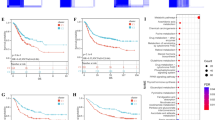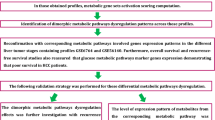Abstract
Gastric cancer is one of the most common cancers and ranks third in cancer-related deaths across globe. Cancer cells are known to take advantage of the altered metabolic processes to sustain their survival, proliferation, and cancer progression. In this investigation, we explored the available genome-wide expression profiles of few hundreds of gastric tumors and non-cancerous gastric tissues and analyzed in the context of metabolic pathways. Gastric tumors were investigated for the metabolic processes related to glucose metabolism, glucose transport, glutamine metabolism, and fatty acid metabolism, by metabolic pathway-focused gene set enrichment analysis. Notably, all glucose metabolism and glutamine metabolism-related gene sets were found enriched in intestinal subtype gastric tumors. On the other hand, the gene sets related to glucose transport and glucan (glycan) metabolisms are enriched in diffuse subtype gastric tumors. Strikingly, fatty acid metabolisms, fatty acid transport, and fat differentiation-related signatures are also highly activated in diffuse subtype gastric tumors. Exploration of the recently established metabolome profile of the massive panel of cell lines also revealed the metabolites of glucose and fatty acid metabolic pathways to show the differing abundance across gastric cancer subtypes. The subtype-specific metabolic rewiring and the existence of two distinct metabolic dysregulations involving glucose and fatty acid metabolism in gastric cancer subtypes have been identified. The identified differing metabolic dysregulations would pave way for the development of targeted therapeutic strategies for the gastric cancer subtypes.






Similar content being viewed by others
References
Alò PL, Visca P, Botti C, Galati GM, Sebastiani V, Andreano T, di Tondo U, Pizer ES (2001) Immunohistochemical expression of human erythrocyte glucose transporter and fatty acid synthase in infiltrating breast carcinomas and adjacent typical/atypical hyperplastic or normal breast tissue. Am J Clin Pathol 116:129–134
Anderson NM, Mucka P, Kern JG, Feng H (2018) The emerging role and targetability of the TCA cycle in cancer metabolism. Protein Cell 9:216–237
Baenke F, Peck B, Miess H, Schulze A (2013) Hooked on fat: the role of lipid synthesis in cancer metabolism and tumour development. Dis Model Mech 6:1353–1363
Barrett T, Wilhite SE, Ledoux P, Evangelista C, Kim IF, Tomashevsky M, Marshall KA, Phillippy KH, Sherman PM, Holko M, Yefanov A, Lee H, Zhang N, Robertson CL, Serova N, Davis S, Soboleva A (2013) NCBI GEO: archive for functional genomics data sets - update. Nucleic Acids Res 41:D991–D995
Biswas S, Lunec J, Bartlett K (2012) Non-glucose metabolism in cancer cells-is it all in the fat? Cancer Metastasis Rev 31:689–698
Cheadle C, Vawter MP, Freed WJ, Becker KG (2003) Analysis of microarray data using Z score transformation. J Mol Diagn 5:73–81
Choi YK, Park KG (2018) Targeting glutamine metabolism for cancer treatment. Biomol Ther 26:19–28
Currie E, Schulze A, Zechner R, Walther TC, Farese RV (2013) Cellular fatty acid metabolism and cancer. Cell Metab 18:153–161
Daniëls VW, Smans K, Royaux I, Chypre M, Swinnen JV, Zaidi N (2014) Cancer cells differentially activate and thrive on de novo lipid synthesis pathways in a low-lipid environment. PLoS One 9:e106913
Epstein T, Gatenby RA, Brown JS (2017) The Warburg effect as an adaptation of cancer cells to rapid fluctuations in energy demand. PLoS One 12:e0185085
Favaro E, Bensaad K, Chong MG, Tennant DA, Ferguson DJP, Snell C, Steers G, Turley H, Li JL, Günther UL, Buffa FM, McIntyre A, Harris AL (2012) Glucose utilization via glycogen phosphorylase sustains proliferation and prevents premature senescence in cancer cells. Cell Metab 16:751–764
Fischer GM, Vashisht Gopal YN, McQuade JL, Peng W, DeBerardinis RJ, Davies MA (2018) Metabolic strategies of melanoma cells: mechanisms, interactions with the tumor microenvironment, and therapeutic implications. Pigment Cell Melanoma Res 31:11–30
Fouad YA, Aanei C (2017) Revisiting the hallmarks of cancer. Am J Cancer Res 7:1016–1036
Freedman JA, Tyler DS, Nevins JR, Augustine CK (2011) Use of gene expression and pathway signatures to characterize the complexity of human melanoma. Am J Pathol 178:2513–2522
Furuta E, Pai SK, Zhan R, Bandyopadhyay S, Watabe M, Mo YY, Hirota S, Hosobe S, Tsukada T, Miura K, Kamada S, Saito K, Iiizumi M, Liu W, Ericsson J, Watabe K (2008) Fatty acid synthase gene is up-regulated by hypoxia via activation of Akt and sterol regulatory element binding protein-1. Cancer Res 68:1003–1011
Hochachka PW, Rupert JL, Goldenberg L, Gleave M, Kozlowski P (2002) Going malignant: the hypoxia-cancer connection in the prostate. BioEssays. 24:749–757
Hur H, Paik MJ, Xuan Y, Nguyen D-T, Ham I-H, Yun J, Cho YK, Lee G, Han SU (2014) Quantitative measurement of organic acids in tissues from gastric cancer patients indicates increased glucose metabolism in gastric cancer. PLoS One 9:e98581
Lauren P (1965) The two histological main types of gastric carcinoma: diffuse and so-called intestinal-type carcinoma. An attempt at a histo-clinical classification. Acta Pathol Microbiol Scand 64:31–49
Lee WNP, Guo P, Lim S, Bassilian S, Lee ST, Boren J, Cascante M, Go VLW, Boros LG (2004) Metabolic sensitivity of pancreatic tumour cell apoptosis to glycogen phosphorylase inhibitor treatment. Br J Cancer 91:2094–2100
Lee SS, Bae SK, Park YS, Park JS, Kim TH, Yoon HK, Ahn HJ, Lee SM (2017) Correlation of molecular subtypes of invasive ductal carcinoma of breast with glucose metabolism in FDG PET/CT: based on the recommendations of the St. Gallen consensus meeting 2013. Nucl Med Mol Imaging 51:79–85
Levine AJ, Puzio-Kuter AM (2010) The control of the metabolic switch in cancers by oncogenes and tumor suppressor genes. Science 330(6009):1340–1344
Li C, Wong WH (2003) In: Parmigiani G, Garrett ES, Irizarry R, Zeger SL (eds) DNA-Chip analyzer (dChip). In the analysis of gene expression data: methods and software. Springer, New York, pp 120–141
Li H, Ning S, Ghandi M, Kryukov GV, Gopal S, Deik A, Souza A, Pierce K, Keskula P, Hernandez D, Ann J, Shkoza D, Apfel V, Zou Y, Vazquez F, Barretina J, Pagliarini RA, Galli GG, Root DE, Hahn WC, Tsherniak A, Giannakis M, Schreiber SL, Clish CB, Garraway LA, Sellers WR (2019) The landscape of cancer cell line metabolism. Nat Med 25:850–860
Martin JD, Fukumura D, Duda DG, Boucher Y, Jain RK (2016) Reengineering the tumor microenvironment to alleviate hypoxia and overcome cancer heterogeneity. Cold Spring Harb Perspect Med 6(12):a031195
Mashima T, Seimiya H, Tsuruo T (2009) De novo fatty-acid synthesis and related pathways as molecular targets for cancer therapy. Br J Cancer 100:1369–1372
Menendez JA, Lupu R (2007) Fatty acid synthase and the lipogenic phenotype in cancer pathogenesis. Nat Rev Cancer 7:763–777
Migita T, Narita T, Nomura K, Miyagi E, Inazuka F, Matsuura M, Ushijima M, Mashima T, Seimiya H, Satoh Y, Okumura S, Nakagawa K, Ishikawa Y (2008) ATP citrate lyase: activation and therapeutic implications in non-small cell lung cancer. Cancer Res 68:8547–8554
Nayak AP, Kapur A, Barroilhet L, Patankar MS (2018) Oxidative phosphorylation: a target for novel therapeutic strategies against ovarian cancer. Cancers 10(9):1–15
Nelson DL, Cox MM (2017) Lehninger principles of biochemistry book, Seventh edn. WH Freeman, New York
Ngo DC, Ververis K, Tortorella SM, Karagiannis TC (2015) Introduction to the molecular basis of cancer metabolism and the Warburg effect. Mol Biol Rep 42:819–823
Nomura DK, Long JZ, Niessen S, Hoover HS, Ng SW, Cravatt BF (2010) Monoacylglycerol lipase regulates a fatty acid network that promotes Cancer pathogenesis. Cell. 140:49–61
Ooi CH, Ivanova T, Wu J, Lee M, Tan IB, Tao J, Ward L, Koo JH, Gopalakrishnan V, Zhu Y, Cheng LL, Lee J, Rha SY, Chung HC, Ganesan K, So J, Soo KC, Lim D, Chan WH, Wong WK, Bowtell D, Yeoh KG, Grabsch H, Boussioutas A, Tan P (2009) Oncogenic pathway combinations predict clinical prognosis in gastric cancer. PLoS Genet 5:e1000676
Pike LS, Smift AL, Croteau NJ, Ferrick DA, Wu M (2011) Inhibition of fatty acid oxidation by etomoxir impairs NADPH production and increases reactive oxygen species resulting in ATP depletion and cell death in human glioblastoma cells. Biochim Biophys Acta Bioenerg 1807:726–734
Rawla P, Barsouk A (2019) Epidemiology of gastric cancer: global trends, risk factors and prevention. Prz Gastroenterol 14:26–38
Romero-Garcia S, Lopez-Gonzalez JS, Báez-Viveros JL, Aguilar-Cazares D, Prado-Garcia H (2011) Tumor cell metabolism: an integral view. Cancer Biol Ther 12:939–948
Rousset M, Fogh J, Zweibaum A (1981) Presence of glycogen and growth–related variations in 58 cultured human tumor cell lines of various tissue origins. Cancer Res 41:1165–1170
Santos CR, Schulze A (2012) Lipid metabolism in cancer. FEBS J 279:2610–2623
Schneider G, Schmidt-Supprian M, Rad R, Saur D (2017) Tissue-specific tumorigenesis – context matters. Nat Rev Cancer 17:239–253
Subramanian A, Tamayo P, Mootha VK, Mukherjee S, Ebert BL, Gillette MA, Paulovich A, Pomeroy SL, Golub TR, Lander ES, Mesirov JP (2005) Gene set enrichment analysis: a knowledge-based approach for interpreting genome-wide expression profiles. Proc Natl Acad Sci U S A 102:15545–15550
Tarca AL, Romero R, Draghici S (2006) Analysis of microarray experiments of gene expression profiling. Am J Obstet Gynecol 195:373–388
Tsuji T, Yoshinaga M, Togami S, Douchi T, Nagata Y (2004) Fatty acid synthase expression and clinicopathological findings in endometrial cancer. Acta Obstet Gynecol Scand. Wiley Online Library 83:586–590
Visca P, Sebastiani V, Pizer ES, Botti C, De Carli P, Filippi S et al (2003) Immunohistochemical expression and prognostic significance of FAS and GLUT1 in bladder carcinoma. Anticancer Res 23:335–339
Wang J, Ye C, Chen C, Xiong H, Xie B, Zhou J, Chen Y, Zheng S, Wang L (2017) Glucose transporter GLUT1 expression and clinical outcome in solid tumors: a systematic review and meta-analysis. Oncotarget. 8:16875–16886
Warburg O (1956) On the origin of cancer cells. Science 123:309–314
Warburg O, Wind F, Negelein E (1927) The metabolism of tumors in the body. J Gen Physiol 8:519–530
Wilson CL, Miller CJ (2005) Simpleaffy: a BioConductor package for Affymetrix quality control and data analysis. Bioinformatics. 21:3683–3685
Yang CS, Matsuura K, Huang NJ, Robeson AC, Huang B, Zhang L, Kornbluth S (2015) Fatty acid synthase inhibition engages a novel caspase-2 regulatory mechanism to induce ovarian cancer cell death. Oncogene 34:3264–3272
Zheng J (2012) Energy metabolism of cancer: glycolysis versus oxidative phosphorylation (review). Oncol Lett 4:1151–1157
Zois CE, Harris AL (2016) Glycogen metabolism has a key role in the cancer microenvironment and provides new targets for cancer therapy. J Mol Med 94:137–154
Acknowledgments
We thank Council of Scientific and Industrial Research (CSIR), Govt. of India for NET-SRF fellowship support to Karthik Balakrishnan. UGC-CEGS, UGC-NRCBS, UGC-CAS, DBT-IPLS, DST-FIST, and DST-PURSE program supported central facilities of School of Biological Sciences, Madurai Kamaraj University are acknowledged.
Funding
This work was supported by the Department of Biotechnology (DBT), Government of India, with the Unit of Excellence (UOE) in Cancer Genetics grant, BT/MED/30/SP11290/2015 to Dr. Kumaresan Ganesan, Madurai Kamaraj University.
Author information
Authors and Affiliations
Contributions
KB and KG conceived and designed the experiments and wrote the paper. KB performed the experiments and KB and KG analyzed the data. KG also contributed the materials.
Corresponding author
Ethics declarations
Conflict of interest
The authors declare that they have no conflict of interest.
Additional information
Publisher’s note
Springer Nature remains neutral with regard to jurisdictional claims in published maps and institutional affiliations.
Rights and permissions
About this article
Cite this article
Balakrishnan, K., Ganesan, K. Occurrence of differing metabolic dysregulations, a glucose driven and another fatty acid centric in gastric cancer subtypes. Funct Integr Genomics 20, 813–824 (2020). https://doi.org/10.1007/s10142-020-00753-w
Received:
Revised:
Accepted:
Published:
Issue Date:
DOI: https://doi.org/10.1007/s10142-020-00753-w




